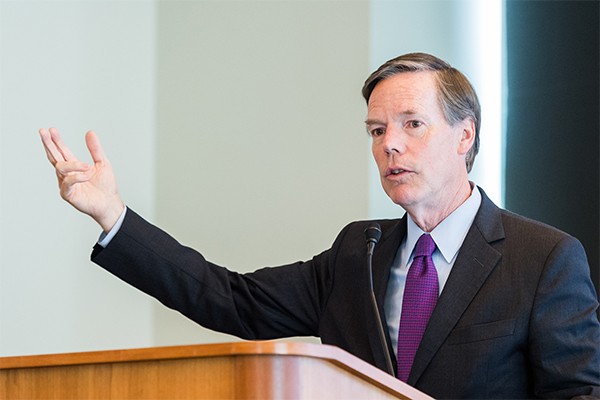Investing In U.S. Innovation, and More – Boston News

Let’s explore some of the most interesting stories that have emerged from Boston business schools this week.
The 1 Thing Your Company Should Add To Its Retirement Benefits – MIT Sloan Newsroom
MIT Sloan Professor Lotte Bailyn took part in a three-year research study under HBS Professor of Business Administration Teresa Amabile to understand the “organizational, social, and psychological forces that can affect people’s retirement experiences.”
Bailyn outlined two strategies to help “pre- and early-retirement individuals manage their transition out of the workforce”:
- The “Phase-down” strategy enables a “retiring employee to work less while receiving a percentage of their pay, plus benefits. At the end of the phase-down — which can range from months to a handful of years —the person retires.”
- The “Contracted rehire” strategy allows companies to hire back employees on a contractual basis, which Bailyn explains, “allowed the company to get the specific niche knowledge that that person has, and by working with other people, employees in the organization could pass on that knowledge.”
Questrom School of Business Professor of Management Tim Hall, one of the researchers on the study, adds, “It’s surprising how little employing organizations are doing to help them [transition]— even though at the same time they’re interested in maybe helping people move on and opening up opportunities for younger people, they’re not. I think there’s a great opportunity cost they’re suffering by not doing that.”
You can find more information on the study here.
How the U.S. Can Rebuild Its Capacity to Innovate – Harvard Business Review
There is a growing trend of companies across all industries choosing to “invent and manufacture abroad” in what Harvard Business School’s Willy Shih describes as a loss of “industrial commons.” According to a recent Harvard Business Review article, “nearly half of the foreign R&D centers established in China now belong to U.S.-based companies.”

“Over recent decades, VCs have overwhelmingly focused on software and biotech investments over ‘hardware’ investments, closing additional doors to manufacturing innovations. It’s no wonder that so many promising manufacturing enterprises have to look abroad to simply get off the ground—let alone soar,” writes Sridhar Kota, Justin Talbot-Zorn, and Tom Mahoney.
The article recently outlines four principles the U.S. could use to reinvigorate its industrial ecosystems.
- Don’t Fear Picking Winners: “Rather than allowing promising R&D results to languish in labs or even be commercialized by foreign competitors, the U.S. should launch a National Innovation Foundation to invest in engineering and manufacturing R&D to mature emerging technologies and anchor their production onshore.”
- Invest in Hardware Startups and Scale-Ups: “U.S. policymakers can … build on existing resources to help innovative hardware startups and scale-ups succeed—particularly through domestic government procurement [the way] China has employed government procurement, strategic technology transfer, and domestic technology development to build its respected high-speed rail industry.”
- Mind the Mittelstand: Small and medium enterprises (SMMs) “amount to about 250,000 firms, or 98 percent of all manufacturing firms. By strengthening and supporting these firms, the U.S. could rebuild the backbone of its manufacturing sector.”
- Power to the People: “While American high schools typically require students to dissect a frog, few require students to disassemble a power tool. Exposure to real-world engineering is a crucial and cost-effective way to build interest in manufacturing careers—through either four-year engineering degrees or vocational training.”
You can find the entire HBR article on re-investing in American industry here.
Legacies Catching On – Carroll School News
BC Carroll School of Management Professor of Information Systems Gerald Kane recently put together a new research report as part of a gig guest editing the MIT Sloan Management Review’s Digital Business Initiative. The report, Coming of Age Digitally: Learning, Leadership, and Legacy, emphasizes the need for companies to foreground experimentation in their “digitally maturation” processes.
According to the Carroll School News, “Nimble businesses create the conditions for employees to take risks and try new things. The key to [prepare] for more digital disruption is to not simply hire but develop digital leaders.”
“Part of developing leaders means giving employees the time and space to acquire new skills, an area where many companies need to improve. Ninety percent of survey respondents said they need to update their digital skills at least yearly—and 44 percent said they need to do so ‘continually.’ Yet at ‘early-stage’ companies (which are paradoxically often the older companies), nearly 30 percent indicated that their employers offered little to no support to do so.”
You can read more about Kane’s research here.
Impulses, a Culinary EMBA, and Immigration Figures – Boston News

Let’s explore some of the most interesting stories that have emerged from Boston business schools this week.
How God Influences Your Grocery Bill – Questrom School of Business Blog
BU Questrom Professor of Marketing Didem Kurt recently co-authored new research with the University of Pittsburgh’s J. Jeffrey Inman and Harvard’s Francesca Gino that explored links between “grocery sales data and rates of religious adherence in thousands of counties across the country.”
According to the study, “religion and religious messages were linked to lower spending.”
People who were reminded of God’s presence were less likely than another control group to spend money on “impulse purchases such as magazines and gum,” an effect that the researchers note “persisted whether or not an individual described themselves as religious.”
Kurt explains, “We attribute this result to the notion that thinking about God reminds people of commonly shared values—such as frugality—even if they don’t believe in God. Managers may want to consider proximity to houses of worship when choosing a retail location. They need to be cognizant of the effect of religious cues and reminders on consumer spending.”
You can read the full article here and check out the complete paper on Science Direct.
A Full-Course Meal – Sawyer Business School Blog
The Sawyer Business School Blog recently profiled David Lanci, EMBA ’02, who after many years as a chef, shifted into the food services industry and founded NexDine, which offers “catering and dining services to corporations, schools, colleges, and senior living facilities around the country.”
Lanci told the Sawyer blog that his Suffolk EMBA “gave [him] the confidence to go out and start this company. One thing I really learned from my EMBA is to take a holistic view of everything and never have a singular view. It’s not just about what’s on the plate.”

NexDine founder David Lanci, EMBA ’02
Lanci continues:
“I realized that how you communicate with the people in the group has a dramatic impact on the outcome. I realized it wasn’t just out of sheer will you could get something done. You had to collaborate, and that was the aha moment for me.”
He concludes, “Food is almost the easy part. It’s just as challenging—if not more so—to manage people, manage clients, manage budgets. And in our industry, we’re not making widgets. We can’t do everything the same way for every client. Every location is different. People’s appetites are different.”
You can read the full interview with Lanci here.
Undocumented Immigrant Population Roughly Double Current Estimate – MIT Sloan Newsroom
According to new research from MIT Sloan’s Mohammad Fazel-Zarandi and Yale’s Edward Kaplan and Jonathan Feinstein, “the number of undocumented immigrants living in the country is about 22.1 million, nearly twice the most prominent current estimate of 11.3 million.”
Fazel-Zarandi explains, “It’s likely that undocumented immigrants are more difficult to locate and survey than other foreign-born residents and if contacted, they may be inclined to misreport their country of origin, citizenship, and number of household residents, fearing the legal consequences of revealing their status.”
He continues:
“A common argument in favor of a tougher immigration policy is that people who have entered the country illegally elevate levels of violent criminal activity.”
“Whatever the extent of criminality that is assessed, it’s clear that crime statistics be thought of in relation to a substantially larger population of undocumented immigrants. This lessens the risk in per capita terms. What’s acceptable for a population of 11 million is unlikely to be sufficient for a population of 22 million.”
You can read the full article here.
DMSB Keynote Speaker Encourages MBAs, New Startups, and More – Boston News

Let’s explore some of the most interesting stories that have emerged from Boston business schools this week.
Life is Like a Venture Investment, Biotech Entrepreneur Tells Business Graduates – D’Amore-McKim Blog
The Northeastern University D’Amore-McKim School of Business selected biotech entrepreneur Dr. Gerald Chan as the keynote speaker at the DMSB graduation ceremony last month.
Dr. Chan, whose private investment firm Morningside Group funds “life sciences startups that are working to discover new ways to treat disease,” implored the assembled crowd at Matthews Arena to “live a life that makes themselves and their loved ones proud” even if “life can be at times so scary and at other times so exhilarating.”
Dr. Chan shared a personal anecdote about his father’s refusal to accept a job at casino on ethical grounds: “Had he accepted that offer, our family would have become financially richer. But because he acted on his ethical principles against his own economic interest, my family can stand tall today.”

D’Amore-McKim School of Business graduates, during last month’s ceremony / Photo via damore-mckim.northeastern.edu
You can read the full article here for a complete overview of the ceremony.
Winning Paper Shows Network Effects Fuel Business Value and Upend Strategy – Questrom School of Business Blog
BU Questrom School of Business‘ Marshall Van Alstyne recently co-authored new research that finds that “platform businesses” that depend on high numbers of users like Microsoft, Apple, Uber, Google, and Amazon scale much faster by moving value creation from “internal production to external orchestration.”
In “Platform Ecosystems: How Developers Invert the Firm,” Van Alstyne and his co-authors conclude that this approach will reverberate through “every part of a business, from marketing to operations to human resources.”
“Instead of a firm doing all its own marketing, consumers can add value through viral marketing. Instead of AirBnB incurring operating costs of a hotel stay, ecosystem partners bear those costs.”
“Instead of hiring employees inside the firm, platforms rely on freelancers outside the firm. In each of these instances, the value-creating activity shifts from inside to outside the firm. This shift affects all of the traditional business functions. It also has profound implications for fair division of wealth in society.”
You can read the full article here and the complete paper here.
25 MIT Startups To Watch – MIT Sloan Newsroom
On Saturday, September 8, Bill Aulet, Managing Director of the Martin Trust Center for MIT Entrepreneurship told the crowd at the MIT Kresge Auditorium, “We’re not just going to be doing another dating app.”
“We’re going to be doing things like addressing inclusion in society, making a more informed citizen throughout the world, cybersecurity, mental health, urbanization, improving ed-tech, improving health care. These are significant problems that the brightest people in the world should be working on, and those people are MIT students.”
The ambitions Aulet spoke about were created from the 25 startups built within the MIT delta v accelerator, which you can check out here.
The Case for Business Curiosity from Harvard, and More – Boston News

Let’s explore some of the most interesting stories that have emerged from Boston business schools this week.
The Business Case for Curiosity – Harvard Business Review
Harvard Business School Professor of Business Administration and Behavioral Scientist Francesca Gino recently published an article in the Harvard Business Review in which she elaborated on the “benefits of and common barriers to curiosity in the workplace.”
Professor Gino points to research, which offers “three important insights about curiosity as it relates to business”
- Curiosity is essential to the performance of an enterprise, leading to “fewer decision-making errors, more innovation, reduced group conflict, and more-open communication and better team performance.”
- By “making small changes” to organization and management, leaders can do more to encourage their employees’ curiosity
- Leaders fear curiosity “will increase risk and inefficiency.”
To address these three insights, Professor Gino offered “five strategies that can help leaders get high returns on investments in employees’ curiosity and in their own”:
- Hire for curiosity.
- Model inquisitiveness.
- Emphasize learning goals.
- Let employees explore and broaden their interests.
- Have “Why?” “What if…?” and “How might we…?” days.
She concludes, “Maintaining a sense of wonder is crucial to creativity and innovation. The most effective leaders look for ways to nurture their employees’ curiosity to fuel learning and discovery.”
You can read more about the business curiosity research here.
Occasional Breaks Can Make Groups Smarter – Questrom School of Business News
BU Questrom’s Jesse Shore recently co-authored new PNAS research, which finds that scientists who integrate “short breaks into problem-solving sessions improves both the average performance of the group and increases the likelihood of getting the best solution.”
The study, which was co-authored by Harvard’s Ethan Bernstein and David Lazer, has “implications for the way we use always-on collaboration software, such as Slack and Google Docs.”
Shore explains, “In many of these [collaborative software tools], the goal seems to be to keep people constantly aware of what others are doing. But the reality is that if you’re getting an alert every time something happens and you’re not taking the time to work separately and have your own independent thoughts, it may hurt the group’s overall ability to solve complex problems.”
You can find the full article here.
Sound Advice: Marketing Students Help Sonos Better Understand Its Customers – Suffolk Experience
The Suffolk Experience recently highlighted Sawyer Business School marketing research collaboration with Sonos, a “go-to source for high-quality home sound systems” that just so happens to be within walking distance of campus.
To accommodate the prediction that over “50 percent of all searches worldwide will be done by voice within four years,” Sonos had thrown its hat in the voice-assistance ring with Apple’s HomePad, Amazon Echo, and Google Home. The company reached out to Sawyer to better understand how late millennial 18-to-24-year-old consumers interact with voice-assistant speakers.
Sonos Consumer Insights Manager Dennis Brosnan writes, “Sonos likes working with Sawyer Business School students because the analysis and recommendations they present are often different than the approach we would take.”
You can read more about the Sonos research here.
MIT Announces 9 African Startup Challenge Finalists, and More – Boston News

Let’s explore some of the most interesting stories that have emerged from Boston business schools this week.
These 9 African Startups are Working Toward a More Inclusive World – MIT Sloan Newsroom
MIT Sloan recently announced the nine African startup finalists of The Initiative on the Digital Economy’s Inclusive Innovation Challenge, all of which use technology to “reinvent the future of work.”
Initiative Director Erik Brynjolfsson writes, “If we employ inclusive innovation globally, it could be the best thing that ever happened to humanity. We can have more wealth, better health, and widely held prosperity.”
Here are the 9 African finalists:
- Wefarm provides a “mobile network accessed through SMS, where millions of small-scale farmers can share information.”
- PrepClass connects students and tutors.
- Wesabi connects “skilled laborers to individuals and businesses.”
- Lynk is an “online platform that operates as a hiring service and also a showcase for artisans.”
- Brave Venture Labs provides “talent sourcing software for growing companies.”
- Moringa School “teaches software development and offers professional skills training.”
- Safi Organics “provides small-scale farmers with affordable fertilizer for their crops.”
- Solar Freeze “offers mobile cold-storage units for small farmers to help reduce crop spoilage.”
- AgroCenta is a “digital platform for rural, small-scale farmers to connect with buyers and access financial services.”
The finalists, who will travel to Nairobi, Kenya in late August to “pitch their ideas at a regional competition,” were selected from almost 200 entrepreneurs from 16 countries.
You can read more about the African startup contenders here.
Collaborate, But Only Intermittently, According to New Study by Harvard Business School Professor and Colleagues – Harvard Business School News
HBS has published new PNAS research, which suggests that always-on technologies like Slack, email, and social media are less effective at complex problem solving than “intermittently on.”
HBS’s Ethan Bernstein, along with BU Questrom’s Jesse Shore, and Northeastern’s David Lazer believe their research could have widespread implications on the workplace, such as “alternating independent efforts with group work over a period of time to get optimal benefits.”
Bernstein writes, “As we replace those sorts of intermittent cycles with always-on technologies, we might be diminishing our capacity to solve problems well.”
You can read more about the research here.
Sizing up Markets, Peering into the Future – Carroll School News
BC Carroll recently hosted its annual Finance Conference in which financial experts delivered a surprisingly “upbeat forecast” on global investment, tech innovations, and cryptocurrencies.
Of the conference’s goals, John and Linda Powers Family Dean Andy Boynton ’78 writes, “We want our students to become lifelong learners, people who look for ideas in many different places. We want them to think both deeply and broadly, and to become great leaders for the future.”
Despite the relative stasis of the larger economy, Harvard’s Kennedy School of Government Professor Nicholas Burns ’78 described this particular moment in American history “consequential” and “chaotic” from a global economy standpoint.
Burns explains that “high on his list of global challenges for the United States is the rising dominance of nations to the East, especially China and India,” particular when the U.S. has not employed “skillful diplomacy and strategic thinking” to accommodate this “coming shift in global power.”

Nicholas Burns (’78), speaking recently at BC Carroll / Photo via bc.edu
He said, “There’s no question that by the next century, we’ll be a Pacific world,”
You can read more about the conference here.
Employee Surveillance, Startup Contests, and More – Boston News

Let’s explore some of the most interesting stories that have emerged from Boston business schools this week.
The Surprising Effects of Employee Surveillance – Questrom School of Business Blog
BU Questrom School of Business professor Michel Anteby recently co-authored new research that explores the ways in which increased surveillance of employees can lead “to workers’ strikes and sometimes even quitting their jobs altogether.”
The article points to a 2011 experiment where TSA managers installed cameras to monitor officers “as an attempt to stop the disappearance of baggage in airports.” According to TSA officers, they felt they “as though their managers were merely looking for a reason to discipline them.”

New BU research finds that workplace scrutiny often leads to a worse work environment, even if it is inadvertently / Photo via bu.edu
According to Anteby’s research, “under such scrutiny, one tends to lose sight of the bigger picture, which ends up with employees feeling undervalued and over scrutinized.”
You can read the full article here.
These 12 European Startups Are Using Technology to Improve Opportunities For Low-And Middle-Income Workers – MIT Sloan Newsroom
The MIT Initiative on the Digital Economy’s Global Inclusive Innovation Challenge announced its 12 European finalists, all of which are working to improve economic opportunity for workers. According to the article, “the competitors are judged on vision, impact, participation, and scalability.”
Initiative Director Erik Brynjolfsson writes, “If we employ inclusive innovation globally, it could be the best thing that ever happened to humanity. We can have more wealth, better health, and widely held prosperity.”
According to the article, the European finalists will travel to “Darmstadt, Germany, in early September, where they will pitch their ideas at a regional competition. The winner of each category then goes on to compete in November during the Global Grand Prize Gala at MIT. The gala includes four $250,000 prizes, one for each category.”
The 12 European finalists, organized by category, are as follows:
Skills Development and Opportunity Matching
- Data4You, an all-ages coding boot camp.
- Jobiri, which “assists people with finding jobs through an AI-driven career adviser.”
- micro:bit, which “provides tiny programmable computers for students and teachers.”
Income Growth and Job Creation
- ABURY’s “Design meets Craft” connects “designers and artisans through a digital platform to find creative project partners, and connect with the global market.”
- mecasa is an “online platform connecting caretakers with senior individuals who need daily support.”
- ProGlove is a “smart glove designed to scan and streamline manufacturing and logistics work.”
Financial Inclusion
- hiveonline is a “mobile platform offering small- and micro-businesses administrative help and access to financial services.”
- Trezeo, which “provides a mobile financial platform for independent workers.”
- Sherpa, which “offers insurance to people who are self-employed, freelancers, contractors, and other entrepreneurs.”
Technology Access
- BLITAB, a “tactile tablet designed for blind and visually-impaired users.”
- Pangea Electronics “builds sustainable and eco-friendly technology.”
- Teqmine Analytics uses “AI to help customers with their research and development questions.”
You can read more about the event here.
Think You’re Having a Heart Attack? If You’re a Woman, Insist on a Female Physician – Harvard Business School News
New PNAS research co-authored by HBS Associate Professor Laura Huang, along with the University of Minnesota-Twin Cities’ Brad Greenwood and Washington University in St. Louis’ Seth Carnahan finds that of “more than 500,000 heart attack patients admitted to hospital emergency departments in Florida between 1991 and 2010, female patients treated by male physicians were less likely to survive than patients of either gender treated by female physicians or male patients treated by male physicians.”
Moreover, “survival rates among female patients treated by male physicians improved with an increase in the percentage of female physicians in the emergency department and an increase in the number of female patients previously treated by the physician.”
In “Patient-Physician Gender Concordance and Increased Mortality Among Female Heart Attack Patients,” the researchers write:
“These results suggest a reason why gender inequality in heart attack mortality persists: Most physicians are male, and male physicians appear to have trouble treating female patients. If female patients tend to be more challenging for male and female doctors to diagnose and treat, the patterns we document may reflect the fact that the most skillful physicians (i.e., female physicians) provide the highest return to their skills when treating the most challenging patients (i.e., female patients).”
You can read more about the research here.
